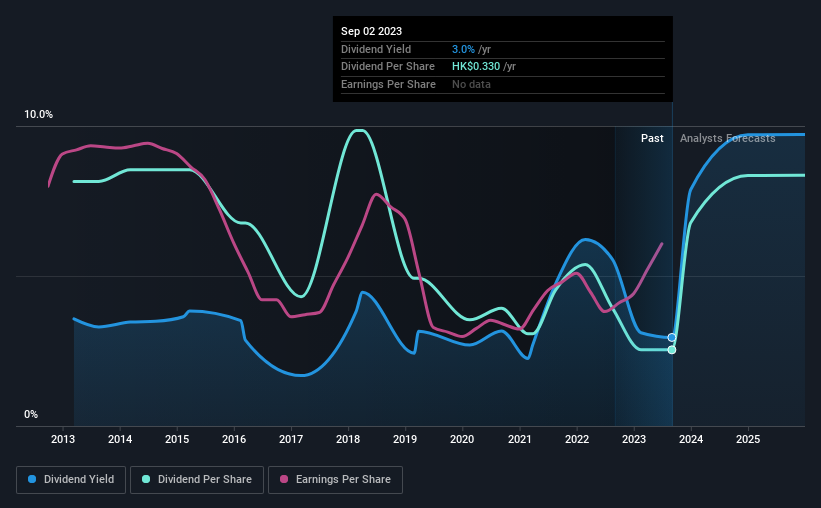The Bank of East Asia, Limited (HKG:23) Looks Like A Good Stock, And It's Going Ex-Dividend Soon

Some investors rely on dividends for growing their wealth, and if you're one of those dividend sleuths, you might be intrigued to know that The Bank of East Asia, Limited (HKG:23) is about to go ex-dividend in just three days. Typically, the ex-dividend date is one business day before the record date which is the date on which a company determines the shareholders eligible to receive a dividend. The ex-dividend date is of consequence because whenever a stock is bought or sold, the trade takes at least two business day to settle. Thus, you can purchase Bank of East Asia's shares before the 7th of September in order to receive the dividend, which the company will pay on the 5th of October.
The company's next dividend payment will be HK$0.36 per share, which looks like a nice increase on last year, when the company distributed a total of HK$0.33 to shareholders. Dividends are a major contributor to investment returns for long term holders, but only if the dividend continues to be paid. We need to see whether the dividend is covered by earnings and if it's growing.
View our latest analysis for Bank of East Asia
Dividends are typically paid out of company income, so if a company pays out more than it earned, its dividend is usually at a higher risk of being cut. That's why it's good to see Bank of East Asia paying out a modest 29% of its earnings.
Companies that pay out less in dividends than they earn in profits generally have more sustainable dividends. The lower the payout ratio, the more wiggle room the business has before it could be forced to cut the dividend.
Click here to see the company's payout ratio, plus analyst estimates of its future dividends.

Have Earnings And Dividends Been Growing?
Stocks with flat earnings can still be attractive dividend payers, but it is important to be more conservative with your approach and demand a greater margin for safety when it comes to dividend sustainability. If earnings fall far enough, the company could be forced to cut its dividend. With that in mind, we're not enthused to see that Bank of East Asia's earnings per share have remained effectively flat over the past five years. Better than seeing them fall off a cliff, for sure, but the best dividend stocks grow their earnings meaningfully over the long run.
Another key way to measure a company's dividend prospects is by measuring its historical rate of dividend growth. Bank of East Asia has seen its dividend decline 11% per annum on average over the past 10 years, which is not great to see.
Final Takeaway
Is Bank of East Asia worth buying for its dividend? Bank of East Asia has seen its earnings per share stagnate in recent years, although the company reinvests more than half of its profits in the business, which could bode well for its future prospects. We think this is a pretty attractive combination, and would be interested in investigating Bank of East Asia more closely.
In light of that, while Bank of East Asia has an appealing dividend, it's worth knowing the risks involved with this stock. To help with this, we've discovered 2 warning signs for Bank of East Asia that you should be aware of before investing in their shares.
If you're in the market for strong dividend payers, we recommend checking our selection of top dividend stocks.
Valuation is complex, but we're here to simplify it.
Discover if Bank of East Asia might be undervalued or overvalued with our detailed analysis, featuring fair value estimates, potential risks, dividends, insider trades, and its financial condition.
Access Free AnalysisHave feedback on this article? Concerned about the content? Get in touch with us directly. Alternatively, email editorial-team (at) simplywallst.com.
This article by Simply Wall St is general in nature. We provide commentary based on historical data and analyst forecasts only using an unbiased methodology and our articles are not intended to be financial advice. It does not constitute a recommendation to buy or sell any stock, and does not take account of your objectives, or your financial situation. We aim to bring you long-term focused analysis driven by fundamental data. Note that our analysis may not factor in the latest price-sensitive company announcements or qualitative material. Simply Wall St has no position in any stocks mentioned.
About SEHK:23
Bank of East Asia
Provides various banking and related financial services.
Adequate balance sheet with moderate growth potential.

